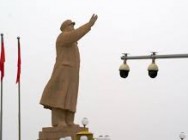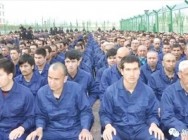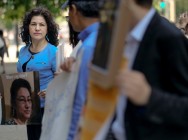Last Minute

- Conflict and Alliance: The US and China: A Centennial Dance: A Century of Relationship from 1900 to 2024
- CHINA RELATIONSEAST TURKESTAN PROBLEM AND TURKEY
- FRONTLINE China Undercover
- Elimination of “Uyghur Counter-Revolutionary Officials” in Academic Fields—Exact Quotes Translated from a Mandarin Audio File
- In Push for Trade Deal, Trump Administration Shelves Sanctions Over China’s Crackdown on Uighurs
- Dalai Lama’s 60th Anniversary Symposium: İlshat Hassan speech in English and Chinese
- Uyghur Detainees from Xinjiang ‘Placed in Nearly Every Prison’ in Shandong Province
- Shahrezad Ghayrat, Unrepresented Women
- Uighur Americans Speak Against China’s Internment Camps. Their Relatives Disappear.
- Rozinisa: The true story of the Uyghur girls in the prison

-

Conflict and Alliance: The US and China: A Centennial Dance: A Century of Relationship from 1900 to 2024
-

CHINA RELATIONSEAST TURKESTAN PROBLEM AND TURKEY
-

FRONTLINE China Undercover
-

Elimination of “Uyghur Counter-Revolutionary Officials” in Academic Fields—Exact Quotes Translated from a Mandarin Audio File
-

In Push for Trade Deal, Trump Administration Shelves Sanctions Over China’s Crackdown on Uighurs
-

Dalai Lama’s 60th Anniversary Symposium: İlshat Hassan speech in English and Chinese
Uyghurs Rely on Chinese Smugglers to Travel to Turkey
Uyghurs from all parts of northwestern China are relying on networks of Chinese smugglers to take them across the border into neighboring Southeast Asian countries en route to their final destination Turkey, according to those who have been caught and detained in Thailand, a key way station.
Nearly 370 Uyghurs — Turkic-speaking, ethnic Muslims from China’s Xinjiang Uyghur Autonomous Region — are being held in four refugee detention centers in Thailand after they were picked up by authorities there for illegally entering the country. The centers are located in the cities of Bangkok, Rayong, Trat and Padang Besar.
During the last couple of years, Uyghurs have been leaving China in droves to escape persecution and repression by authorities who consider them separatists and terrorists and have cracked down on their religion and culture. Chinese authorities have blamed an upsurge of violence in Xinjiang since 2012 on terrorists and Islamist insurgents seeking to establish an independent state.
The Uyghurs detained in camps in Thailand are from Urumqi (in Chinese, Wulumuqi), the capital of Xinjiang, and the prefectures of Turpan (Tulufan), Kashgar (Kashi), Aksu (Akesu) and Hotan (Hetian), according to Seyyid Abdulkadir Tumturk, a representative of the Turkey-based Uyghur organization the East Turkestan Culture and Cooperation Association in Thailand.
“They first go to Chinese cities,” he told RFA’s Uyghur Service about the Uyghurs who have fled Xijiang. “The Chinese smugglers take the Uyghurs to Cambodia, Vietnam and other bordering countries. The Chinese have connections, so when the Uyghurs are taken to a certain destination, the smugglers then hand them over to other smugglers, and they continue to smuggle them all the way to Malaysia, from where the Uyghurs to go to Turkey.”
Uyghurs detained in Thailand and ones who have made it to Turkey told Tumturk that they were “forced to abandon their homeland, memories, lives and loved ones” and risk everything to escape persecution in China.
“It is certain that Uyghurs are risking everything because of the persecution that the Chinese government has brought upon them,” he said. “It’s getting impossible for the Uyghurs to have human rights there.”
About 70 Uyghurs have been detained in a government-run refugee detention center in Padang Besar in Songkhla province’s Sadao district, southern Thailand, since March 2014 in cramped and unhygienic conditions, sources there told RFA.
Many have complained of worsening conditions and poor food quality, and held a hunger strike in January to demand authorities improve the situation at the facility. One ethnic Uyghur boy detained there died last December after contracting tuberculosis.
The 300 others are being held at the other detention facilities.
The detainees have remained in limbo more than a year into their detention, with Beijing demanding they be repatriated to China.
Nabbed in Thailand
One Uyghur who was detained in a police station in Thailand told RFA that he, his pregnant wife, and three children were arrested in February in the southern part of the country near the Malaysian border while they were traveling without passports en route to Malaysia and then to their final destination Turkey.
“Before we embarked on this journey, we talked to the Chinese people who agreed to take us out of China. We paid them money. There are Chinese human smugglers there. We didn’t know them, but some people put us in touch with them to take us across the Chinese border.”
It took his family 10 days to travel from the Chinese border to Thailand via Myanmar and Laos before they were arrested in Thailand, he said. Most of the time, they traveled by car, but had to use small canoes between Laos and Thailand.
“We walked on foot from the Chinese border to Myanmar where prearranged people picked us up and took us to the Laos border and to Thailand,” he said. “I cannot tell you how much [money we paid], but the rest of it was going to be wired after we made it to our final destination.”
When Thai officials arrested them, the Uyghur told them that he and his family were Turkish citizens.
“They brought two Chinese interpreters, but I told them that I wasn’t Chinese, so they left,” he said.
The family took such a huge risk because of “the endless suffering, hardships and layers upon layers of pressure and persecution heaved upon us” by Chinese authorities in Xinjiang, he said.
“We [Uyghurs] were deprived of our rights to protect our women, our children, culture, our nationality and people,” he said. “Simply put, were not treated as humans.”
China’s heavy-handed rule in Xinjiang
Uyghur exiles and rights groups have criticized Chinese authorities’ heavy-handed rule in the region — including police raids on Uyghur households, restrictions on Islamic practices, and curbs on the culture and language of the Uyghur people — which they say has forced many to flee overseas, often through Southeast Asia.
“If China calls them [the Uyghurs] criminals, then it should call the ones who are taking the Uyghurs’ money to take them out of China criminals,” Tumturk said.
Ismail Madadam, head of Islamic center of Songkhla province, who is helping the Uyghur detainees, told RFA that the people in the refugee detention centers are not terrorists.
“They might be people who are seeking justice,” he said. “There is a very narrow line between someone seeking justice and terrorists. When they fight for justice, someone is going to say they are terrorists.”
Abdul Aziz Pitakumpol, one of the most prominent Muslim leaders in Thailand, agreed.
“The Uyghurs here are not terrorists,” he told RFA.” “They are the people who are looking for freedom to practice their religion.”
Thai Immigration authorities are in the process of verifying the identities of the Uyghurs in the detention centers, who claim to be Turkish citizens, said Choosuk Panutumpron, deputy commander of Immigration Division 6 at the Thai Immigration Bureau.
He said the detainees are not victims of human trafficking, despite the fact that people smugglers brought them into the country.
“Since there is not slavery, prostitution or other exploitation involved in their cases, we cannot call it trafficking in humans,” he told RFA. “They are the people who wanted to travel by paying human smugglers.”
A Turkish diplomat based in Bangkok, who declined to be identified, said the ball was still in Thailand’s court regarding what to do with the Uyghurs.
“Turkey’s position on Uyghur case is not going to change,” he said, referring to the country’s efforts to relocate the Uyghur refugees to Turkey.
Turkish officials would continue to discuss the issue with the Thai government through diplomatic and other channels, he said.
Right to choose their citizenship
Chalida Tajaroensuk, director of Thai civil society group People’s Empowerment, pointed out that Thailand is not a signatory to the 1951 U.N. Refugee Convention and does not have a formal national asylum framework, so anyone who comes there to seek refuge is considered an illegal migrant.
“They have been put in detention centers, and after their citizenship has been determined, they will be deported back to their countries,” he said. “But when it comes to the Uyghurs, there is big problem between China and Turkey [because] both countries claim that the Uyghurs are their citizens. So, it is very difficult for the Thailand to make decision.”
But Tajaroensuk noted that under the U.N.’s International Covenant on Civil and Political Rights, which Thailand ratified in October 1996, the Uyghurs have the right to choose their citizenship.
“The Uyghurs want to go to Turkey, so they should be allowed to leave,” he said. “Thailand should respect all the articles of the covenant, [but] it is putting its diplomatic relationship with China ahead of them. It’s not fair.”
The Uyghurs ended up in Thailand because their human rights were being violated and they were subject to racism in China, Tajaroensuk said.
“If the people are not happy living in that county, and the policy of that county does not respect human rights, religion or culture, … they have the right to leave the country to search for a better life,” he said.
Reported by Mamatjan Juma of RFA’s Uyghur Service. Translated by Mamatjan Juma. Written in English by Roseanne Gerin.
http://www.rfa.org/english/news/uyghur/uyghurs-rely-on-chinese-smugglers-to-travel-to-turkey-05282015163942.html
RELATED NEWS












